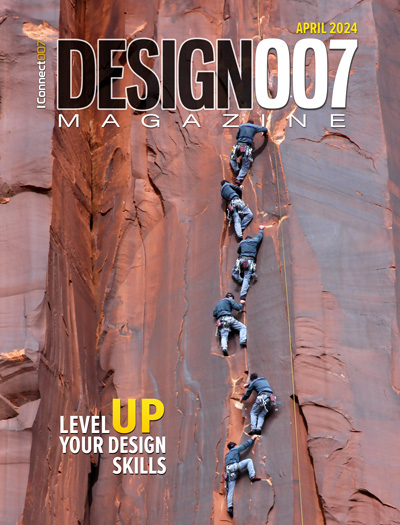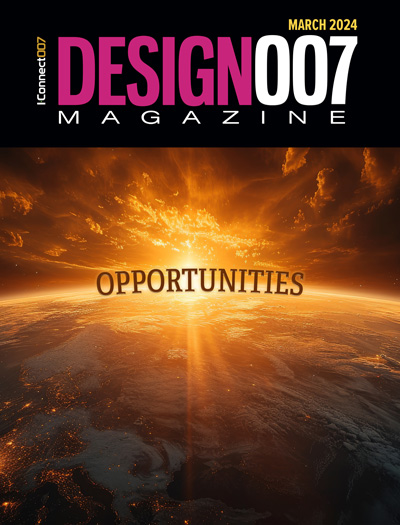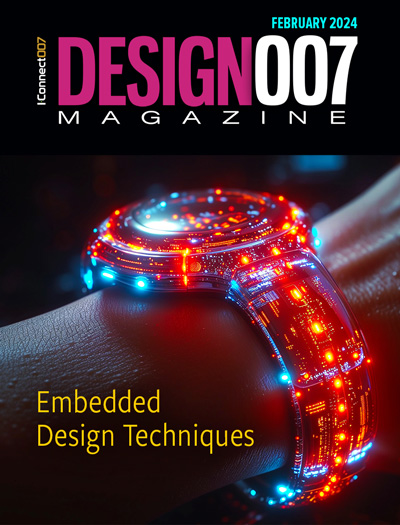-

- News
- Books
Featured Books
- design007 Magazine
Latest Issues
Current Issue
Level Up Your Design Skills
This month, our contributors discuss the PCB design classes available at IPC APEX EXPO 2024. As they explain, these courses cover everything from the basics of design through avoiding over-constraining high-speed boards, and so much more!

Opportunities and Challenges
In this issue, our expert contributors discuss the many opportunities and challenges in the PCB design community, and what can be done to grow the numbers of PCB designers—and design instructors.

Embedded Design Techniques
Our expert contributors provide the knowledge this month that designers need to be aware of to make intelligent, educated decisions about embedded design. Many design and manufacturing hurdles can trip up designers who are new to this technology.
- Articles
- Columns
Search Console
- Links
- Events
||| MENU - design007 Magazine
With Tribal Knowledge, Trust but Verify
March 13, 2023 | I-Connect007 Editorial TeamEstimated reading time: 2 minutes
Tamara Jovanovic is a design engineer with Happiest Baby, a manufacturer of smart baby beds that alert parents if the infant needs attention and soothes the baby back to sleep. She also recently completed her master’s degree in electrical engineering by studying around her work schedule.
Since Tamara has been absorbing new information from the halls of academia and her workplace, we asked for her thoughts on differentiating between tribal knowledge and documented fact. Is tribal knowledge a friend, foe, or a little of both?
Andy Shaughnessy: Tamara, being a recent grad school student and working in the industry as a designer, you probably have some thoughts on tribal knowledge.
Tamara Jovanovic: As a person who started really young, in the beginning all you seek is help and validation that you're doing a good job or confirmation that you're not making mistakes.
In those first few years, tribal knowledge is welcome. As a young person, you're fresh and eager to learn. You're trying to understand the ins and outs of your job and the industry. With time, you gain some experience, and you realize that suddenly, you have this knowledge that is your own.
You slowly start to see certain things that may be outdated or that there are better ways to do things. However, I don't think tribal knowledge is a “fail,” or necessarily bad. It's a great starting point, but the tech industry progresses so fast and there are new technologies and improvements coming out all the time. I need to do my own research.
Barry Matties: Coming into the industry as a young person, and coworkers were sharing their knowledge, did you question it, or did you just accept it?
Jovanovic: A little of both, really. At my company, it’s not like they say, “Here’s how we do things. You must follow these rules.” It’s more like, “You’re young; here’s what I know and how I do it.” From there on, it’s on me how I use that information. It’s more of a positive way of sharing experiences and knowledge among each other.
We’ve always had a very young and small team, so we work very closely, and we are glad to get each other's input because you can look at something for hours and not realize that there is a small mistake right in front of you. A fresh set of eyes might spot such things immediately. We work together to evolve as a team and adapt better processes that would help save us time and money.
We have a very good culture of taking what we've already done with a grain of salt and seeing if we can improve it.
To read this entire conversation, which appeared in the March 2023 issue of Design007 Magazine, click here.
Suggested Items
Digitalisation and ESG
04/19/2024 | Marina Hornasek-Metzl, AT&SDigitalisation and ESG are prominent and high-priority topics in the global business community. The first focuses on applying technology throughout the value chain to produce faster, smarter, and more desirable business outcomes. The latter emphasises the broader value a business is expected to create for its stakeholders from an environmental, social, and governance perspective.
Real Time with... IPC APEX EXPO 2024: Looking Back, Looking Forward With IEC
04/19/2024 | Real Time with...IPC APEX EXPOIEC came to the RTW booth and discussed both the legacy of IEC's past and the vision for its future. Industry veteran Bruno Ferri highlighted his quarter-century tenure in the industry and with IEC since its founding. He still exhibits boundless enthusiasm for the industry. Brando Stone, a young professional and a future face of IEC, talked about IEC's plans going forward and his experience at this year's IPC APEX EXPO.
Seeking Employment: Meet Parker Capers
04/18/2024 | Barry Matties, I-Connect007Parker Capers, a cybersecurity professional with a decade of experience in the SMT industry, earned a bachelor’s degree from DeVry and is CompTIA Security Plus certified. He is open to various industries but has a strong affinity for manufacturing due to extensive familiarity. Parker appreciates smaller companies where personal connections matter. Are you hiring?
SEMI Applauds CHIPS Program Office Progress to Diversify U.S. Semiconductor Industry Workforce
04/18/2024 | SEMIThe SEMI Foundation, the arm of SEMI dedicated to supporting economic opportunity for workers and the sustained growth of the microelectronics industry by creating pathways and opportunities for job seekers, applauded strides made by the CHIPS Program Office to diversify the U.S. semiconductor industry workforce and its release of the First Annual Report Regarding the Opportunities and Inclusion Activities Undertaken by the Department of Commerce.
VDMA: Machine Vision Navigating Through Uncertain Times
04/18/2024 | VDMAFor over a decade, the European machine vision industry has reported steady growth, with turnover increasing by an average of 9 percent annually between 2012 and 2022. Despite a temporary setback in 2020 (minus 4 percent) due to the Covid-19 pandemic, the industry rebounded strongly in 2021 (plus 17 percent) and 2022 (plus 11 percent).


